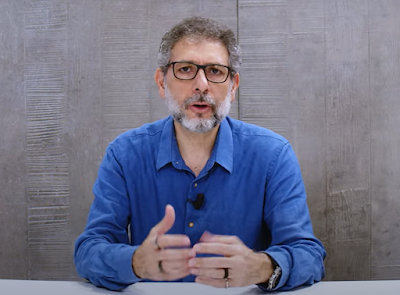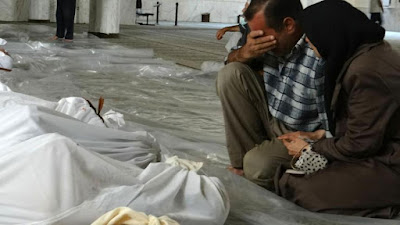Dans
un entretien au «Monde», le géopoliticien Frédéric Encel estime que
seul le retour de l’Autorité palestinienne à Gaza pourrait constituer un gage
d’apaisement. Pour le politiste Ziad Majed, les Etats-Unis et le reste de «la
communauté internationale» peuvent faire bouger les choses en utilisant les
bons outils.
Propos
recueillis par Michel Lefebvre et Gaïdz Minassian
Le
7 octobre 2023 a provoqué un séisme dans la région et au-delà. Comment en
est-on arrivé là?
Frédéric Encel: Ce gigantesque pogrom, cet acte barbare et antisémite visait
non seulement des juifs en tant que tels, mais aussi un projet – conforme à la
Charte originelle du Hamas – consistant à les délégitimer et à les
animaliser... Ce massacre a été perpétré par un mouvement islamiste radical,
issu de la mouvance extrémiste des Ikhwan, les Frères musulmans, confrérie
antisémite, homophobe et misogyne à incandescence qui aurait pu se contenter de
commettre un coup de force militaire. Après tout, Israël est considéré comme
une puissance occupante, même si à Gaza on peut toujours en débattre. Or, le
Hamas ne s’est pas contenté d’une opération militaire, mais il a perpétré un
véritable carnage sur des civils, qu’il assume du reste, même de manière
fluctuante. Enfin, il a toujours cherché à casser toute possibilité de
promotion de l’Autorité palestinienne (AP), qui, en droit international, est la
seule entité à représenter le peuple palestinien, puisque le Hamas a tout fait
pour torpiller, en même temps que l’extrême droite israélienne, les accords
d’Oslo de 1993, par, déjà, des attentats très meurtriers dans les quartiers
exclusivement juifs des cités israéliennes.
Ziad Majed: Politiquement, le 7 octobre a forcé un retour de la question
palestinienne sur la scène internationale. Sur le terrain, une description des
attaques du Hamas permet de dire qu’il y avait deux phases. La première,
légitime, celle de l’attaque contre des positions militaires israéliennes qui
imposent un blocus contre Gaza depuis 2007. La seconde comprend des crimes de
guerre, puisque ciblant des civils en tant que tels. Par ailleurs, je pense que
parler d’antisémitisme comme motif principal des attaques occulte le contexte,
le droit international, et ne permet pas de comprendre l’évolution de ce que l’on
appelle «conflit israélo-palestinien», d’autant plus que le 7 octobre n’est ni
le début de ce conflit ni sa fin.
Où en sommes-nous aujourd’hui?

F. E.: Par un faux paradoxe lié aux guerres asymétriques dans lesquelles, en
principe, la puissance dominante finit par être politiquement la perdante, le
Hamas va perdre la guerre car il est seul. Les régimes modérés arabes ne
veulent pas du Hamas ni des Frères musulmans, et ni Pékin ni Moscou ne le
soutiennent sérieusement. Au Moyen-Orient plus qu’ailleurs, s’affaiblir militairement,
c’est de manière mécanique s’affaiblir aussi politiquement. Et, de ce point de
vue-là, Israël a décidé d’en finir avec le Hamas, avec lequel le premier
ministre israélien, Benyamin Nétanyahou, a été complaisant depuis son retour au
pouvoir en 2009, incitant un Qatar ambigu sinon duplice à le financer
généreusement. Il a cru ainsi pouvoir concomitamment émollier le Hamas et
affaiblir l’AP. Cette politique du pire a échoué. Or, en rejetant le retour de
l’AP à Gaza, Nétanyahou s’inscrit dans la pensée magique, car, d’une part, la
grande majorité des Israéliens ne souhaitent pas réoccuper Gaza, et, d’autre
part, aucun gouvernement arabe ne prendra le risque d’envoyer ses soldats
occuper la zone en arrivant a fortiori dans les fourgons de Tsahal, l’armée
israélienne ! Donc, qui ira ?
Z. M.: Il y a trois objectifs israéliens dans cette guerre. Les deux premiers
sont annoncés par le gouvernement Nétanyahou – anéantir le Hamas et libérer les
otages. Le Hamas est certes affaibli, mais loin d’être anéanti. Quant aux
otages, la seule libération importante qui a eu lieu jusqu’à présent a été
négociée dans le cadre d’une trêve et d’un échange de « prisonniers ». Le
troisième objectif israélien, non annoncé par le gouvernement mais par
plusieurs responsables et surtout exécuté par l’armée, est la destruction des
conditions de vie à Gaza (espaces urbains, habitats, infrastructures, sources d’eau,
champs agricoles, hôpitaux, écoles, universités, etc.), afin que la zone ne
soit plus habitable, poussant ainsi à moyen terme le plus grand nombre possible
de Palestiniens à partir. Cela s’inscrit dans une stratégie israélienne de changement
démographique en Palestine. Car, en parallèle, la politique de colonisation en
Cisjordanie et à Jérusalem-Est occupés s’intensifie depuis des années, et les
confiscations de terres et attaques des colons épaulés par l’armée contre les
personnes et les biens deviennent un quotidien. L’objectif étant, là aussi, de
morceler le territoire, d’imposer plus de colons et donc de modifier l’espace
et sa démographie.







%20%E2%80%A2%20Photos%20et%20vid%C3%A9os%20Instagram.png)















